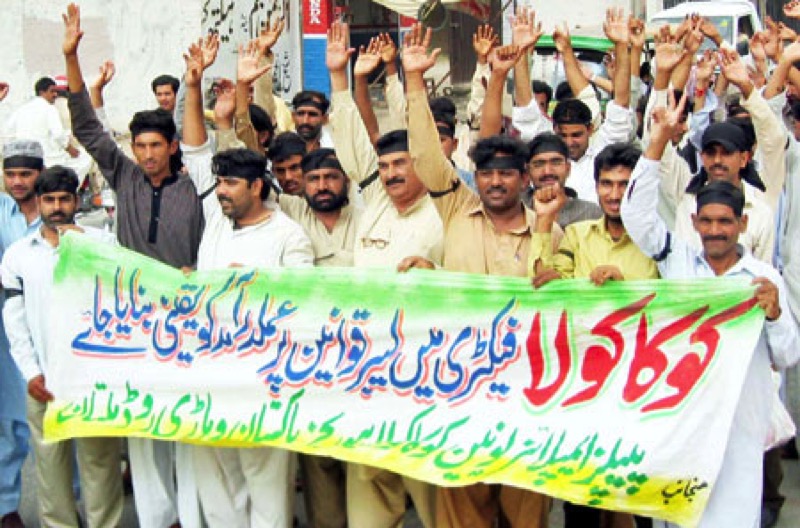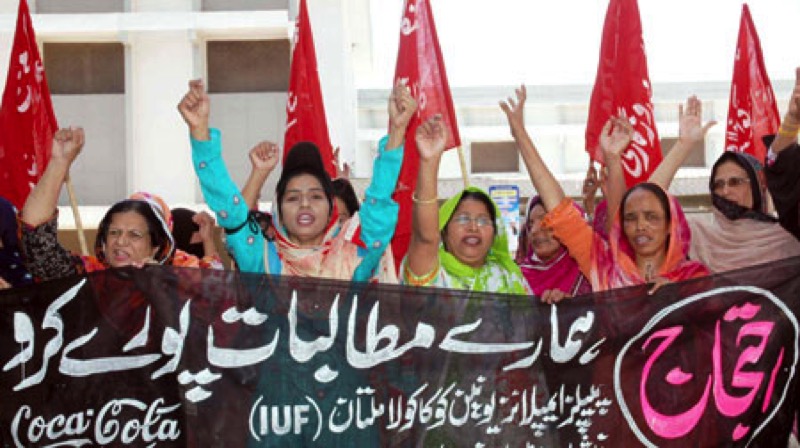Coke's Crimes in Pakistan
Campaign Reports | Newletter Archive
China | Colombia | El Salvador | Guatamala | India | Kenya | Pakistan | Philippines | Tanzania | Turkey
Update (7/26/10) ;re: Coke in Multan, a southern city in Pakistan:
According to the article below, the bitter conflict pitting Coke workers against The Coca-Cola Co. and its bottlers in Pakistan has been, at least for now, resolved.
Comprehensive Agreement Ends Long, Bitter Conflict at Coca-Cola Pakistan
Read Article
Excerpts from "The Pause that Represses: Coca-Cola Pakistan Greets New Union with Death Threats, Abduction, Extortion and Dismissals"
IUF, "The Pause that Represses: Coca-Cola Pakistan Greets New Union with Death Threats, Abduction, Extortion and Dismissals," June 18, 2010
Read Article
Since forming a union at Coca-Cola's bottling plant in the southern Pakistan city of Multan in June 2009, members have met with death threats, abduction, firings, extortion, forgery and fraud.
Management's vicious response to the workers' fight for a union is a story drenched with violence, corruption, sleaze and escalating criminality.
The Multan plant is part of Coca-Cola Beverages Pakistan Limited. (CCBPL), jointly owned by Turkish bottler Coca-Cola Icecek (CCI) and The Coca-Cola Company (TCCC) based in Atlanta...
Extortion and Blackmail

May 20, 2010, union rally calls for labour laws to be implemented and respected by management.
Management's response to union organizing in Multan was immediately hostile. As the union prepared for its founding congress on June 19, 2009, management began a campaign of blackmail and extortion targeting the 36 sales and merchandizing officers (SMOs) at the plant identified as active union supporters. On June 8 all SMOs were ordered to sign stamped, blank legal documents (the type used for affidavits or confessions) and to hand over signed blank personal checks. Those who refused this clearly illegal order were ordered to stay in the plant and barred from their sales routes - resulting in lost sales commissions amounting to a third of their monthly income. For 20 days SMOs were harassed into handing over these checks illegally. Four who refused were ultimately dismissed, together with three "temporary" workers directly employed at the plant, all of them strong union supporter.
When the NFFBTW and IUF informed both the national management of CCBPL and TCCC in Atlanta of the new union's formation on June 25, when it filed for registration with the District Labour Officer, management responded with escalating attacks on union officers in an attempt to force the union to disband...
Abduction...
Attempted registration was followed by "night visits" to the private homes of union officers on June 27 and 28; eight Coca-Cola Multan managers tried to force union officers to quit the union or sign a letter withdrawing the union's application for registration. On the morning of June 28, union joint secretary Riaz Hussain was abducted by managers, held in an unknown location and threatened until released later that day...
Death threats...
Local management became more desperate as the IUF and the NFFBTW increased pressure on TCCC and CCBPL to respect trade union rights in Multan, resorting to death threats against union officers and their families. Unknown men began visiting the homes of the union officers, including general secretary Muhammad Ashiq Bhutta, who is also national information secretary of the NFFBTW. They delivered a clear message from Coca-Cola Multan management: withdraw from the union or you or your family members could have "an accident" and be injured or killed...
Creation of a management union
To further block any possibility of the workers winning legal recognition of their union, management set up its own 'union', called the "Workers Welfare (Mazdoor) Union". Through a combination of bribery and threats, CCBPL Multan management secured registration of their fake union on August 13.
From fake union to fake labour contractor...
In addition to the 7 union members dismissed in the early stages of the union struggle, management last year dismissed 20 other direct Multan employees who were active union members. The termination letters were issued by 'Muhammad Saeed Awan Labour Contractor' despite the fact that these workers were directly recruited by CCBPL, and had never received payment from, heard of or ever seen Saeed Awan or any representative at any time during their employment at CCBPL Multan.

Women Workers' Federation rally in support of the Multan Coke workers.
The dismissal letters contain no address letterhead for the shadowy 'Saeed Awan Labour Contractor'. The official government database on employers paying into the mandatory pension scheme contains no such entity on record as supplying labour to Coca-Cola or any other business in Pakistan...
Through crude forgery of official documents and massive fraud, management is attempting to establish the fiction that union members at CCBPL are not in fact employed by the company where they have many years of service. This of course would exclude them from any collective bargaining relationship with Coca-Cola ...if Saeed Awan Labour Contractor really existed. However, if it did then CCB PL would be guilty of even more crimes under Pakistan law, since there is no legal provision for a "recruitment agency" which leaves workers with the status of "contract worker" not directly employed by the user enterprise.
Excerpts from "Pakistan: What has Coke got to hide?"
Green Left, "Pakistan: What has Coke got to hide?" July 4, 2010
Read ArticleOn May 28, the website of the International Finance Corporation (IFC), the World Bank's private sector lending arm, announced that Coca-Cola Beverages Pakistan Ltd (CCBPL) had applied for a US$60 million loan. The loan sponsors were CCBPL's two owners, the Atlanta, US-based Coca-Cola Company (TCCC) and Coke's Turkish-based bottler for Pakistan and the Middle East, Coca-Cola Icecek (CCI)...
Any IFC loan is subject to an assessment under IFC social and environmental "performance standards" addressing the applicant's social and environmental record and the project's likely impact. A formal challenge can be made based on these standards.
"Having informed both TCC [Coca-Cola] and CCI [Coca-Cola Icecek] of the IUF's intention to challenge the loan application owing to the company's serial violations of basic rights at their Multan plant in Pakistan's Punjab district, the IUF made an official complaint to the IFC, backed by substantial documentation — only to be told that CCBPL had withdrawn its application...
"So why would Coke walk away at the last minute from $60 million on easy terms? Was it worried its claims to meet the Performance Standards couldn't withstand IFC scrutiny once the IUF filed its formal complaint?
"In response to the IUF complaint, the IFC would have needed to revisit its evaluation of the loan application and particularly the degree to which the applicant respected its standards.
"If CCBPL's labour rights record was so grossly at odds with the company's claims, what else about the operation might emerge from an IFC investigation? The potential risks were apparently sufficiently troubling for Coke's Pakistan bottler CCBPL to turn its back on the IFC money."











